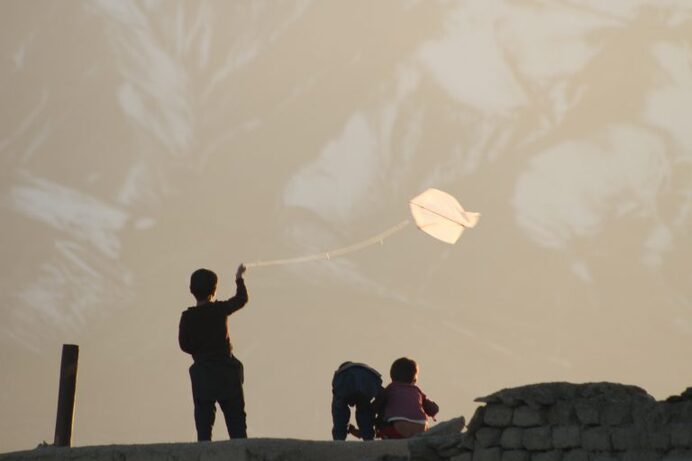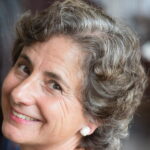DISPLACED

Photo Courtesy of Farid Ershad
Mid-August last year, when Fatema* answered her cell phone, she heard her sister Shaima’s frantic voice, “I’m at the airport. Can you bring me my passport right now?”
Not a simple request. On a normal day, it would have been dangerous for Fatema, who was 23 and single, to ride in a cab alone. That day, Taliban soldiers filled the streets of Kabul, harassing and detaining thousands of people, many of whom were fleeing to the Hamid Karzai International Airport. If she ventured out, she could lose her life or disappear forever.
Fatema’s brother-in-law, Haji, and her sister had spent the last six years working for the US military. As Afghanistan fell to the Taliban, the US government offered to airlift them from the city. Fatema knew if Shaima and Haji didn’t manage to escape quickly, they would face grave and certain danger. Without thought for her own safety, Fatema said goodbye to her mother, grabbed the passport and hailed a cab.
When Fatema arrived at the airport, the cabby demanded all her cash, including her return fare home. If she refused to comply, he threatened to deliver her into the hands of the Taliban. As he drove off, Fatema stood clutching Shaima’s passport. Eventually, in the chaotic sea of people, she located Shaima and Haji. They spent the night outside the airport, trying to rest, despite the sounds of screaming, gun shots and explosions. Ultimately and miraculously, all three were evacuated to the United States. They arrived traumatized, one passport between them, and with little other than the clothing on their backs.
After a stay in a government camp in the Midwest, they were sent to our town in central Virginia. The International Rescue Committee worked hard to set them up with the basics: housing, clothes, food vouchers, identification papers and some English tutoring.
In Afghanistan, Haji and Shaima had steady employment, a savings account and access to a car. Fatema held various jobs while pursuing a college degree. Here, none of that mattered.
To become self-sufficient, they needed to find jobs as quickly as possible. That’s hard to do if you don’t speak English well or don’t have access to dependable transportation. In addition, many job listings and applications are online. With no proof of income, they couldn’t set up a Wi-Fi account in their apartment. They have access to free Wi-Fi at the library, but it’s a bus ride away and bus schedules are online and in English. I could go on, but you get the idea. Rebuilding your life from scratch is complicated.
However, here is some good news. After weeks of searching, a tenacious volunteer found part time jobs for Haji and Fatema at a grocery store. Their combined salaries just might cover rent but won’t be enough to save for much else. Haji and Fatema are thrilled, though, because even a low paying part time job is a step in the right direction. Haji, a former engineer, is studying for his American driver’s license. Mobility would open more doors for this family. These days, after putting in a full day of work, Fatema meets with a volunteer who is helping her study for exam to be certified as a TNA—the first step to getting certified as a CNA, with the goal of starting nursing school as soon as possible. The TNA exam is in a few days and it’s the last time it will be offered, so they are working long and hard.
Evenings, I drink ginger tea from my favorite cup, the one that has “Lou’s Diner” printed on it. Sometimes, I sit in my favorite rocker and watch the sun set over the meadow behind our house. Other times, at day’s end, I’ll take a walk with my neighbor, an old friend. We’ll talk about whether it’s safe to plant tomatoes or if there might be frost on the weekend. On most days, my life is filled with mundane gifts: sipping tea from my favorite mug, watching the sun set, and a walk with a friend.
In a flash and possibly forever, my Afghan friends, these displaced people, have lost that mug, that chair, those comforting people. Fatema took a quick trip to the airport having no idea she was leaving her mother and her life behind. Facing myriad challenges, these brave folks must forge a new life for themselves. Some of their success will depend on how fully we, as a community, embrace them and walk alongside them on their journey.
These past weeks, we’ve watched Putin wreak havoc on Ukrainians. He has upended the lives millions of people and murdered many others. And it’s not just the Ukrainians who are displaced; war and famine have uprooted millions of other people across the globe.
What does it take to put a life back together, to bring people to a place where they can thrive? Based on my limited experience with my three resourceful, resilient Afghan friends, it takes a lot. President Biden has announced the US will accept 100,000 Ukrainian refugees. What will it take to help them re-settle? When I think of all the displaced people across the globe, I feel despair, but my despair helps no one.
Can one person make a difference?
Maybe the trick is to keep our hearts open toward others and to step toward needs that are within our power to meet.
*Names have been changed to protect family members who are still in Afghanistan.

Podcast: Play in new window | Download
Well done. I have been volunteering with the IRC for some years, and like you,
am impressed with the refugees’ bravery and resilience. so good what you’re doing.